| Building |
Image |
Location |
Built Around |
Type |
Fun Facts |
| Mississippian Mounds, e.g. Emerald Mound site |
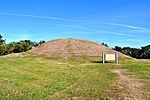 |
All over Mississippi |
800–1600 AD |
Earthen mounds |
While no original Native American houses from this time are still standing, these large earth mounds were built by ancient people. They are very old and important! |
| LaPointe-Krebs House |
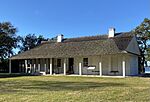 |
Pascagoula |
1757 |
House/Military |
This is the oldest building in Mississippi! It's also the only one left from when the French were in charge. It's now a museum you can visit. |
| Dog Trot House "Scotia" |
|
Grand Gulf |
1768 |
House |
This is the oldest house built by British settlers in Mississippi. It was moved to Grand Gulf Military State Park in 1974. It's special because it uses wooden pegs instead of nails! |
| King's Tavern |
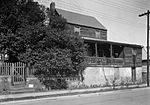 |
Natchez |
1769–1789 |
Military |
Many people think this is the second oldest building in Mississippi and the oldest in Natchez. It was built when the British controlled the area. |
| Mount Locust |
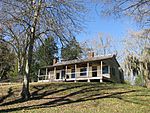 |
Stanton |
1780 |
House/Inn |
This old British home was also an inn for travelers on the famous Natchez trace road. Today, it's a museum run by the National Park Service. |
| Hope Farm |
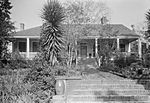 |
Natchez |
1780–1792 |
House |
This historic house in Natchez was once home to a Spanish leader named Carlos de Grand Pré. He was a governor when Spain controlled this area. |
| Richmond |
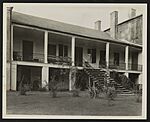 |
Natchez |
1784 |
House |
This early Natchez house might have been built for a Native American interpreter. A rich banker later owned it and added more parts to the house. |
| Linden |
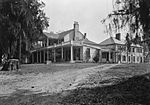 |
Natchez |
1785 |
House |
This is another early home in Natchez. It was built for Alexander Moore. Some changes were made to it in 1815. |
| Springfield Plantation |
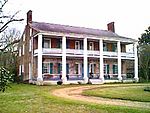 |
Fayette |
1786–1791 |
House |
This is one of the oldest, if not the oldest, stone buildings in Mississippi. It's also believed to be where Andrew Jackson, who later became president, had his first wedding! |
| Spanish House |
|
Grand Gulf |
1790 |
House |
This is one of only two original buildings left in the old "ghost town" of Grand Gulf. It was fixed up in 1958 and is also in the Grand Gulf Military State Park. |
| Airlie |
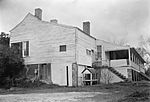 |
Natchez |
1793 |
House |
This Natchez home was built during the time of Spanish rule. More parts were added to it in the 1830s and 1850s. |
| Cottage Gardens |
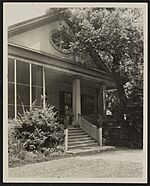 |
Natchez |
1795 |
House |
This Natchez house was built for Don José Vidal, a Spanish government official. The town of Vidalia, Louisiana was named after him! |
| House on Ellicott's Hill |
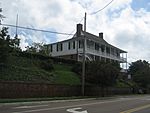 |
Natchez |
1798 |
House |
This early Natchez home was one of the first to be restored by the Natchez Garden Club in the 1930s. You can visit it as a museum today. |
| Texada |
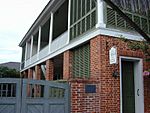 |
Natchez |
1798–1805 |
House |
This is the oldest brick building in Natchez! It was built by Manuel Garcia de Texada and was considered the most valuable building in the city in 1805. |
| Gloucester |
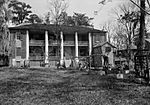 |
Natchez |
1803 |
House |
This Natchez home was designed by Levi Weeks. It was later inherited by the wife of Winthrop Sargent, who was the very first Governor of the Mississippi Territory. |
| China Grove |
|
Lorman |
1804 |
House |
This old plantation home has a log cabin at its center, believed to be built in 1804. It was built by Willis McDonald, a soldier from the Revolutionary War. |
| The Elms |
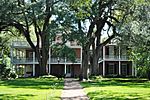 |
Natchez |
1804 |
House |
This early Natchez home was built by John Henderson from Scotland. It later became a home for Presbyterian ministers. |
| Stutzman House |
|
Woodville |
1805 |
House |
This is one of the oldest buildings left in Woodville. It was the home of the French Stutzman family. |
| Mistletoe |
|
Natchez |
1807 |
House |
This house was built as a wedding gift for Peter Bisland, whose father was from Scotland. |
| Meadvilla |
|
Washington |
1808 |
House |
This is one of the oldest buildings in the former town of Washington. It was built for Cowles Mead, a politician who was a secretary and acting governor of the Mississippi Territory. |
| Desert Plantation |
|
Pinckneyville |
1808-1812 |
House |
This early plantation was started by Robert Semple in 1808. It's built in an "early Federal" style. |
| Ford House |
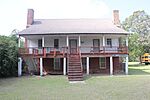 |
Sandy Hook |
1809 |
House |
This is one of the oldest homes in the Pearl River Valley. Important meetings for the Methodist church happened here. Famous people like General Andrew Jackson also stayed at this house. |
| Woodville Baptist Church |
|
Woodville |
1809 |
Church |
This is believed to be the oldest church building still standing in Mississippi. |
| Port Gibson Reveille Building |
|
Port Gibson |
1810 |
Commercial |
This is an old building used for businesses in Port Gibson. It's part of a historic area called the Market Street-Suburb Ste. Mary Historic District. |
| Miss Phoebe's House |
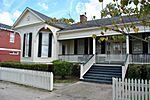 |
Port Gibson |
1811 |
House |
This is an early house in Port Gibson, also part of the Market Street-Suburb Ste. Mary Historic District. |
| Salisbury Plantation |
|
Woodville |
1811 |
House |
This old plantation house was likely built by Captain Moses Hook. It's named after his home area in Massachusetts. |
| Selma Plantation |
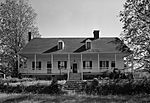 |
Natchez |
1811 |
House |
This early Natchez home was built for Gerard Chittocque Brandon. His son, also named Gerard Brandon, later became a governor of Mississippi. |
| Auburn |
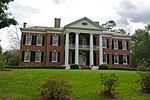 |
Natchez |
1812 |
House |
This large house was designed by Levi Weeks for Lyman Harding, who was the first Attorney General of Mississippi. The city bought it in 1911. |
| Blantonia Plantation |
|
Lorman |
1812 |
House |
This is an early plantation house built for John Blanton. |
| Glenfield Plantation |
 |
Natchez |
1812 |
House |
The oldest part of this Natchez plantation house was built around 1812. |
| Holly Grove |
|
Centreville |
1812 |
House |
This early plantation was started by Duncan Stewart, who came from North Carolina. It's built in an "early Federal" style. |
| Rosemont |
 |
Woodville |
1814 |
House |
This house was the childhood home of Jefferson Davis, who later became a very important figure in American history. |
| White Cottage |
|
Natchez |
1814 |
House |
This house, also known as Twin Oaks, is believed to have been built around 1814. |
| Routhland |
|
Natchez |
1815 |
House |
Construction on this early house started around 1815 for John Routh. The Routh family was one of the richest in Mississippi. Later, Charles Clark, a Mississippi Governor, owned it. |
| 617 Market Street |
|
Port Gibson |
1815 |
Commercial |
Another early business building in Port Gibson, part of the historic district. |
| 623 Market Street |
|
Port Gibson |
1815 |
Commercial |
This is also an early business building in Port Gibson. |
| 710 Market Street |
|
Port Gibson |
1815 |
Commercial |
An early business building in Port Gibson. Its second floor was removed after a fire in 1968. |
| Smithland |
|
Kingston |
1815–1817 |
House |
This early home was built for Benijah Smith. It's the only "Federal-style" building left in the old settlement of Kingston. |
| Myrtle Bank |
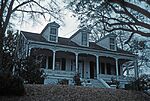 |
Natchez |
1816 |
House |
This home was built for George Overaker before 1817. Later owners expanded it to its current size. |
| Pecan Grove |
|
Church Hill |
1816 |
House |
This early plantation house was built by Thomas Baker, who came from New Jersey. |
| Englesing Home |
|
Port Gibson |
1817 |
House |
This early home in Port Gibson is believed by some to be the birthplace of Constance Cary Harrison. |
| Planter's Hotel |
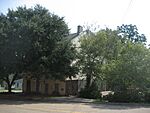 |
Port Gibson |
1817 |
Hotel |
This is an early hotel building in Port Gibson, built in the "Federal" style. |
| The Cedars |
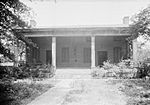 |
Columbus |
1818 |
House |
This is the oldest known building in the city of Columbus. |
| Old Mississippi State Capitol |
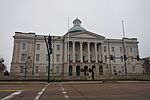 |
Jackson |
1839 |
Capitol |
This building served as the state's capitol and is the oldest known building in Jackson. |
| Temple Gemiluth Chassed |
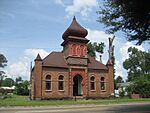 |
Port Gibson |
1892 |
Synagogue |
This is the oldest synagogue (Jewish house of worship) still standing in Mississippi. |





























